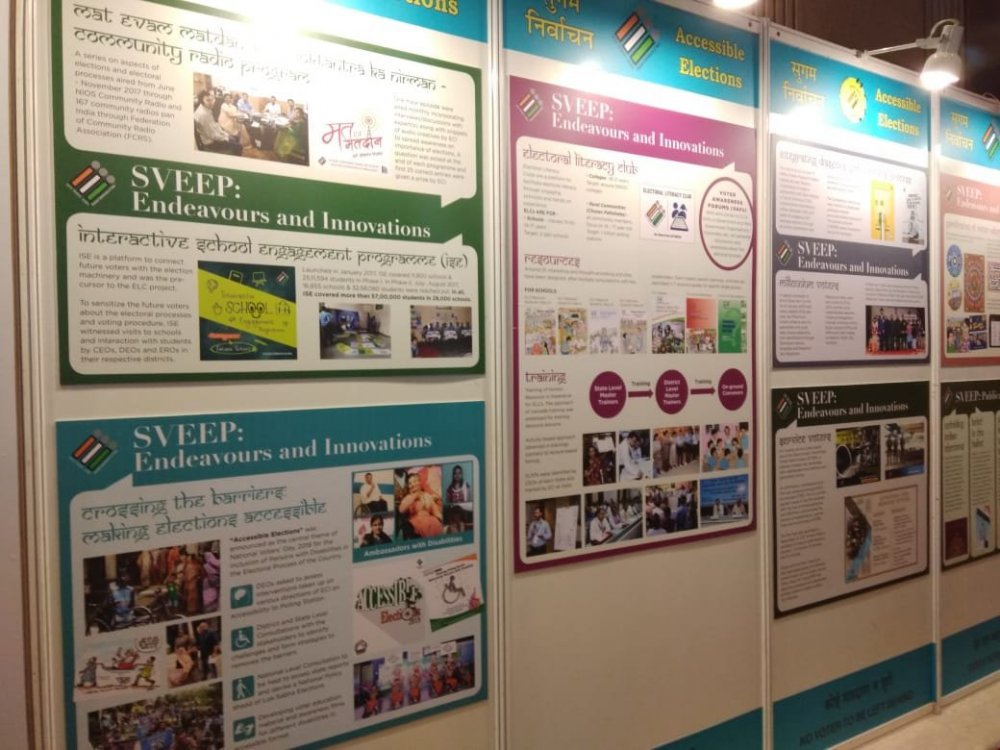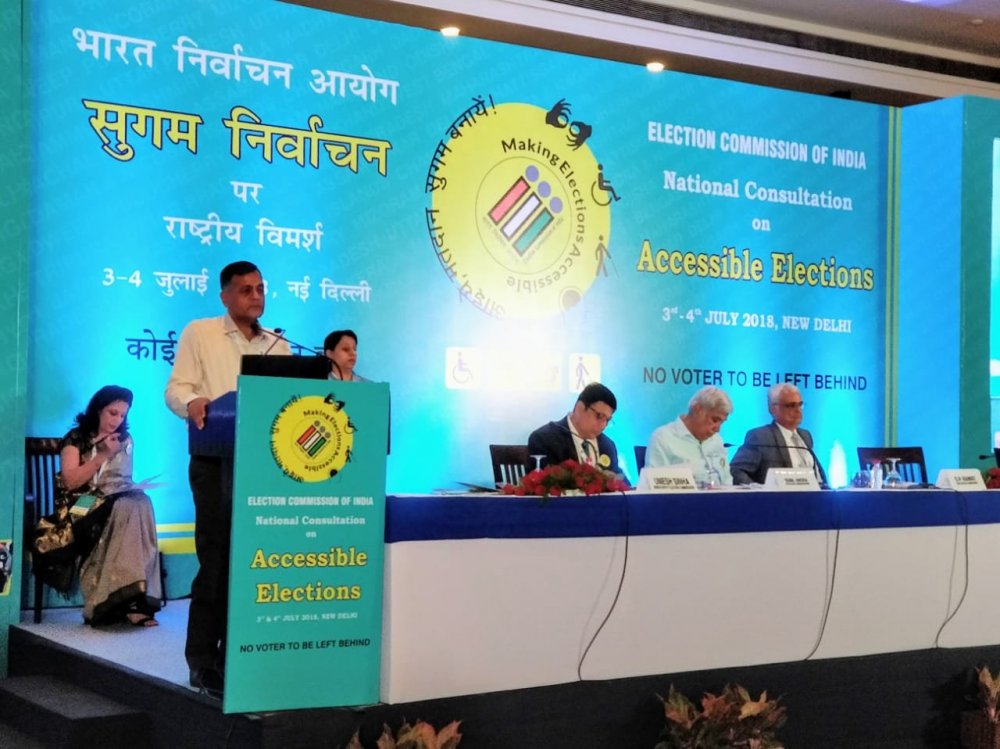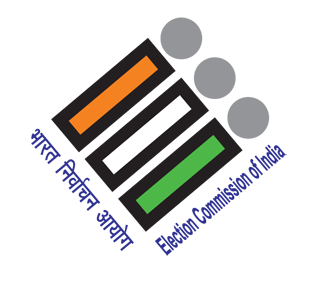

Event created by SVEEP-ECI



10: 36 am
The aim of the Consultation is to develop a national policy which will enable the inclusion and enhanced participation of Persons with Disabilities (PwDs) in the electoral process.




10:47 am
The participants of the consultation have been presented with a Consultation Kit - all the contents of the kit have been prepared by Persons with Disabilities (PwDs).

10: 55 am
"The rights and guarantees provided by the Constitution of India to all citizens have to be exercised by all without barriers, without handicap" - Sh. Ashok Lavasa. He further adds that it is the responsibility of all public institutions to ensure that all are able to exercise these rights. The removal of the existing discrimination existing in the society is necessary.

10:57 am
"The spirit of voluntary activities is important for achieving what we aim to achieve", Sh. Ashok Lavasa, Election Commissioner.
The National Consultation is in line with the Commission's motto of 'No Voter to be Left Behind'


The National Consultation is a culmination of over 500 district level consultations and 36 state level consultations.


11:15 am
Hon'ble CEC urges the participants to come up with a strategy for treating the insensitivity at hand. He encourages the participants to not restrict themselves in their recommendations to the Commission through the Consultation.

11: 20 am
The Commission launches the Systematic Voters' Education and Electoral Participation (SVEEP) Division' official online portal.

11:25 am
The Commission also launches cVigil.
cVigil is a simple, android based mobile app through which citizens can promptly report unlawful campaign activities within minutes of having witnessed them and without having to rush to the office of the returning officer. The application connects the vigilant citizen with District Control Room, Returning Officer and Field Verification Unit and creates a rapid and accurate reporting, action and monitoring system. - as explained by Deputy Election Commissioner Sh. Sandeep Saxena.

11:45 am
The first Technical Session of the Consultation has commenced. This session will feature 6 presentations by the Chief Electoral Officers of various Indian States that will share the Best Practices regarding inclusion of PwD electors in their respective States.

11: 55 am
Mr. Shiv Kumar from Departments of Empowerment of Persons with Disabilities gives the opening presentation to the session.
He talks about Actions taken by DePWD which include -
- Formation of Election cell in DePWD
- Intimation to all States/UTs to ensure accessibility in educational institutions
- Appointment of Nodal Officers
- Review of booklet "enabling voters with disabilities"
- Generation of guidelines to supplement ECI publication 'Providing facilities to PwDs'

12:00 pm
Sh. Sanjeev Kumar, Chief Electoral Officer, Karnataka gives his presentation
Challenges in Karnataka -
- PwDs with mental ability related issues are by law and convention still outside the purview of Electoral Process
-
Bangalore city an area of focus
Best Practices by Karnataka include -
- Braille ballots
- Ramps at every polling station
- Volunteers for assistance of PwD electors
- Sensitisation of BLOs
- Braille Postcards sent out to visually impaired electors
- Use of community Radio
- Tricycle rally for PwDs
- Roping in of ambassadors for motivating the PwD electors

12:10 pm
Dr. Aariz Aftab, Chief Electoral Officer, West Bengal, now on the dias for his presentation on best practices in West Bengal.
- Intensive mapping of PwD electors through BLO house-to-house surveys
- Online enrollment of PwDs through NVSP ( National Voters' Service Portal) www.nvsp.in
- House-to-house registration of PwDs
- SVEEP promotions by PwDs themselves
- Establishment of PwD Electoral Literacy Clubs in all special schools and institutions
- Photo Voter Slips for electors to avail priority polling
- Awareness brochures on instructions for poll day in Braille
- Provision of transportation from home to polling booth for PwD electors
- Existence of Disability Specific Centres for awareness and facilitation
- Development of motivational videos
- Publicity of helpline number 1950 for assistance
West Bengal is presently developing an app that will help facilitate PwD electors on poll day. Through the app PwD electors will be able to describe their disability, mention the kind of facilitation required, provide their location and will be able to access various transportation facilities.

12:20 pm
Dr. S. Murali Krishna, Chief Electoral Officer, Gujarat presents the Best Practices of his State
- Partnerships with NGOs working for the disabled
- Organisation of awareness drives in district across the State
- Persons with Disabilities as icons for voter awareness
- Facilitation at Polling Stations - provision of wheelchairs and construction of ramps
- Recently celebrated Helen Keller Day and popularise the hashtag #OurBallotTalks
- Organisation of pre-poll workshops for the sensitisation of PwD electors for the poll day

12:30 pm
Sh. Pushpendra Rajput, Chief Electoral Officer, Himachal Pradesh on the podium with his presentation on the State's best practices
- Himachal first mapped all the PwDs in Himachal 6 months before elections. The identified PwDs were then facilitated for registration
- Skill Development workshops organised with Campus Ambassadors ( young volunteers on college campus) for the facilitation of PwDs
- Association with various departments associated with PwDs
- Muskan Thakur, a university student, vocalist who is visually impaired is the State icon of Himachal and motivates all electors
- Braille ballot
- Bike rally flagged off by visually impaired electors
- Certificates of appreciation given to PwD voters
- Motivation was the focus in efforts.

12:40 pm
Ms. Sowjanya, Chief Electoral Officer, Uttarakhand presents the best practices of her State.
Challenges in Uttarakhand include challenging hilly terrain, altitude, no road access, pregnant women, braille not understood by visually impaired persons, uselessness of wheelchairs due to the terrain and narrow door widths. Despite the challenges, the voter turnout of PwD electors in the last election recorded at 30%.
Best Practices -
- Divyang Mitra - volunteers (identified by their unique caps) from the NSS, NYKS, NCC and Scouts and Guides for facilitation at Polling Stations
- Divyang Dolis - for transportation of not only PwDs but pregnant women and old electors as well
- Invitation Card in vernacular language inviting the PwD electors to come and vote
- Efforts in smoothing the floors and paths, removing cracks and damages for seamless access
- Accessible Voting - taking care of table height (for electors suffering from dwarfism) , space to maneuver
- Appreciation letters to PwD voters after casting of vote
Suggested Actions -
- Sign language instructions and close captioned videos to be produced
- Giving of phone numbers of volunteers directly to the PwD elector in the next elections
- Advertisements with sign language
- Vehicle Stickers for vehicles of PwD electors

12:50 pm
Sh. F R Kharkongor, Chief Electoral Officer, Meghalaya gives his presentation on the best practices in Meghalaya
- Mission Unite Programme - making of the largest human logo in the country
- Roadshow by PwDs in the run up to the National Voters' Day
- Inclusion of PwDs in the Electoral Literacy Clubs
- Translated material in local languages
- Blind Football Team organises football matches for motivation
- The band, Light After Dark' organises 'every voter maters' themed rock shows
- Creatives on wall paintings and rock paintings motivating the PwD electors
- Polling officers presented the medal of appreciation for their work in voter facilitation
- Silent Village in Massar, where special BLO was assigned.
- Accessible website
Suggestions -
- Different color scheme for Electors Photo Identity Cards (EPICs) of PwDs
- People with mild mental disabilities be allowed to vote
- Evolving and adapting the standard sign language (ISL) into something understood by uneducated aurally impaired electors

01:05 pm
Ms. N Manjushree, Deputy Commissioner of Mandya District, Karnataka presentation on initiatives taken for the PwD electors at District Level.
- Surveys for database of disability-specific PwDs
- Rehabilitation Centres for training of functionaries who would further sensitise PwDs for the poll day
- 'Michina Nondani' campaign was carried out that focused on registration of PwDs and transgenders
- 10 polling stations fully manned by Person with Disabilities
- Creation of braille pamphlets and ballot paper
- A3 magnified sheets for visually impaired people
- Created video on how to use VVPAT - used for the first time in the last general elections - loaded on the phones of BLOs
- Provision of Assured Minimum Facilities (AMF) at polling booths
- Creation of 'Chunave Mobile App'

01:15 pm
Breakout for lunch

3:00 pm
The participants are now divided under 5 working groups -
Group 1: Blindness and Low Vision
Group 2: Deaf and hard of hearing
Group 3: Locomotor Disability including cerebral palsy, leprosy cured, dwarfism, acid attack victims of muscular dystrophy
Group 4: Intellectual disability including autism, specific learning disability and mental illness
Group 5: Multiple disabilities including deaf-blindness
They will be deliberating over three core themes -
1. Accessible Registration Process including use of IT
2. Accessible Polling Station including EVM/VVPAT & other Facilitation measures
3. Voter Education and leveraging Partnerships
Each group will be preparing a presentation on each of the topics. These presentation will be delivered tomorrow, on the second day of the Consultation, over thematic panel discussions.

July 4, 2:45 pm
The Closing Session of the two day long National Consultation on Accessible Elections has now commenced graced by the presence of Hon'ble Chief Election Commissioner Sh. O. P. Rawat, and Election Commissioners Sh. Sunil Arora and Sh. Ashok Lavasa at The Lalit.

July 4, 02:50 pm
Sh. Surendra Kumar, CEO Odisha presents a summary of recommendations made by the working groups of the Consultation for the first theme i.e. Accessible Registration Process including use of IT.

July 4, 03:00 pm
Sh. H. R. Srinivas, CEO Bihar, makes his presentation on the summary of recommendations made for the second theme of the National Consultation, i.e. Accessible Polling Station including EVM/VVPAT & other Facilitation measures.
Top recommendations include -
- Sensitization of the polling officers for assisting the PwDs in using Electronic Voting Machine /Voter Verifiable Paper Audit Trail.
- Instructions in Braille and audio at the polling stations. Posters in large fonts for low vision voters.
- App to guide PwDs to reach the Polling station and return home
- Feedback from PwDs/CSOs/visiting sheet remarks to improve upon existing facilities.

July 4, 03:20 pm
Election Commissioner, Sh. Ashok Lavasa is now on the dias presenting his remarks on the recommendations of the Consultation.

July 4, 03:30 pm
Senior Deputy Election Commissioner, Sh. Umesh Sinha takes the dias.
Important announcement made - The Electors' Photo Identity Card (EPIC) for visually impaired electors will now also be made in Braille. The first two Braille EPICs presented by the Commission to their recipients.

July 4, 03:32 pm
The Strategic Framework on Accessible Elections has been released by the Commission. The framework details on Barriers, Inclusive Voter Education, leveraging technologies, research,study and knowledge sharing, Role of Partner Departments, Role of Educational Institutions, Role of CSOs, Media, Poll Volunteers, Training and sensitisation of staff, Alternative voting methods, and the set up of committees.

July 4, 03:35 pm
Hon'ble Chief Election Commissioner, Sh. O.P. Rawat presents his final remarks on the two day National Consultation on Accessible Elections.
He speaks about the decision taken by the Commission on a couple of issues like -
- The inclusion of a window on sign language interpreter in all audio visual material produced for training or voter education.
- Accessible Photo Voter Slips will be made available for PwDs
- Committees will be set up, Accessibility Master Trainers will be appointed for cascade training and ensuring enhancement of capabilities
- Free Public Transport to the PwDs on day of Poll
- Accessibility Division will be set up in the India International Institute of Democracy and Election Management for continuous research and development of facilitation measures for PwDs.
- Follow- up action on recommendations within 3 months

July 4, 03:46 pm
Hon'ble CEC ends his address on positive and motivational note, encouraging all to do all in their power to enhance the participation of PwD Voters in the electoral process.

July 4, 03:48 pm
Ms. Padma angmo, Director, SVEEP delivers her Vote of Thanks to all stakeholders of the National Consultation.

July 4, 03:55 pm
The National Consultation on Accessible Elections has been officially concluded.
 Election Commission of India’s Systematic Voters’ Education and Electoral Participation (SVEEP) Division in consonance with the NVD theme for 2018 is organising a two-day National Consultation on Accessible Elections on 3rd and 4th July, 2018 in New Delhi.
Election Commission of India’s Systematic Voters’ Education and Electoral Participation (SVEEP) Division in consonance with the NVD theme for 2018 is organising a two-day National Consultation on Accessible Elections on 3rd and 4th July, 2018 in New Delhi.
The Consultation would mark the culmination of a series of District and State-Level workshops undertaken in pursuance with ECI’s commitment to enhance the processes of engagement, facilitation and participation of specially-abled voters. Building upon the acquired knowledge the National Consultation would seek to generate tangible results and real, positive impact at a pan-India level with regard to the key stakeholder category of Persons with Disabilities.
-
Who's Online 0 Members, 0 Anonymous, 1 Guest (See full list)
- There are no registered users currently online







